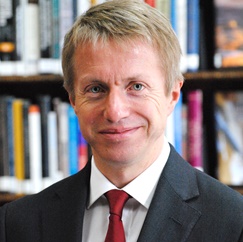Biography
John Nilsson-Wright (formerly Swenson-Wright) is senior research fellow for Northeast Asia with the Asia Programme at Chatham House, senior university lecturer in Japanese Politics and International Relations at Cambridge University, and an official fellow of Darwin College, Cambridge. He was head of the Chatham House Asia Programme until October 2016 and is a graduate of Christ Church, Oxford; SAIS, Johns Hopkins; and St. Antony’s College, Oxford.
His research focuses on Cold War history and the contemporary international relations of Northeast Asia, with particular reference to Japan and the Koreas. He is the author and editor of several books, including Unequal Allies? United States Security and Alliance Policy Toward Japan 1945-1960 (Stanford University Press, 2004); Crisis of Peace and New Leadership in Korea: Lessons of Kim Dae-jung’s Legacies (Seoul: Yonsei University Press, 2014), and The Politics and International Relations of Modern Korea (Routledge, 2016).
His recent articles include Nuclear crisis on the Korean peninsula: strategic adaptation, the Abe Administration and extended deterrence in the face of uncertainty, Japan Forum (2018), and Creative Minilateralism in a Changing Asia: Opportunities for Security Convergence and Cooperation between Australia, India, and Japan, Chatham House (2017).
He has been a visiting fellow at Tohoku University, Yonsei University, and Seoul National University, a member of the World Economic Forum’s (WEF) Global Agenda Council (GAC) on Korea, and is a director of the UK-Japan 21st Century Group. In 2014, he was awarded the 10th Nakasone Yasuhiro prize.
He comments regularly for the global media, has testified on East Asian affairs to the House of Commons Foreign Affairs and Defence Committees, is a member of the editorial board of Global Asia, and is a founding member of the European Japan Advanced Research Network (EJARN).
His research focuses on Cold War history and the contemporary international relations of Northeast Asia, with particular reference to Japan and the Koreas. He is the author and editor of several books, including Unequal Allies? United States Security and Alliance Policy Toward Japan 1945-1960 (Stanford University Press, 2004); Crisis of Peace and New Leadership in Korea: Lessons of Kim Dae-jung’s Legacies (Seoul: Yonsei University Press, 2014), and The Politics and International Relations of Modern Korea (Routledge, 2016).
His recent articles include Nuclear crisis on the Korean peninsula: strategic adaptation, the Abe Administration and extended deterrence in the face of uncertainty, Japan Forum (2018), and Creative Minilateralism in a Changing Asia: Opportunities for Security Convergence and Cooperation between Australia, India, and Japan, Chatham House (2017).
He has been a visiting fellow at Tohoku University, Yonsei University, and Seoul National University, a member of the World Economic Forum’s (WEF) Global Agenda Council (GAC) on Korea, and is a director of the UK-Japan 21st Century Group. In 2014, he was awarded the 10th Nakasone Yasuhiro prize.
He comments regularly for the global media, has testified on East Asian affairs to the House of Commons Foreign Affairs and Defence Committees, is a member of the editorial board of Global Asia, and is a founding member of the European Japan Advanced Research Network (EJARN).

